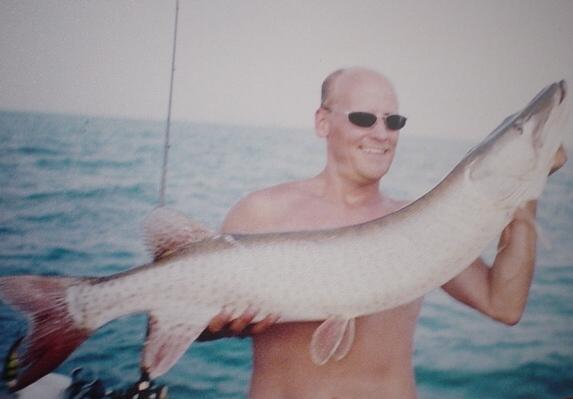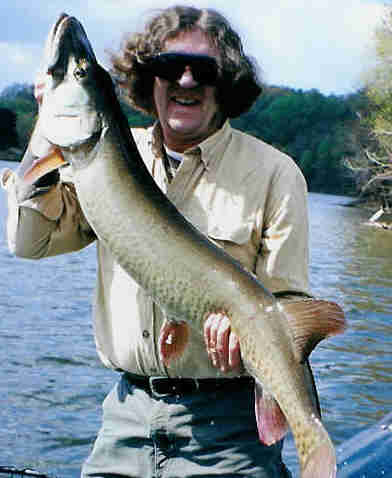|
|
Posts: 929
Location: Rhinelander. | I know that in in the animal kingdom inbreeding occurs and can damage the genitic line of the animal. They may be smaller, not as strong and get disease prone. My question is this then. In smaller lakes like many we have in wisconsin could this happen to a musky or any type of fish that is low density? I have looked for research on it and not been able to find an answer. I have been told by some people thats it unlikely but wondering if anyone has a better response. I know it seems far fetched to many to think of it even but I just wonder over time could this happen.
Don Pfeiffer | |
| | |

Posts: 3242
Location: Racine, Wi | Maybe some of the southern boys might know.  Just kidding, put down the reefhawgs and slowly back away. Just kidding, put down the reefhawgs and slowly back away. | |
| | |

Posts: 20278
Location: oswego, il | Can't say I have ever seen an albino musky but i have seen one playing the banjo!
Interesting topic, I hope somebody has some serious info on the subject. | |
| | |
Posts: 259
Location: Alexandria, MN | I really don't think this will ever be a problem. The lakes that get stocked with Tigers, are stocked with a certain number of fish, and the Tigers can't reproduce. They are used to control the panfish populations.
With the stocking of pure muskies, you are open to breeding, but very few of these stocked lakes will have an area that is good for spawning. Many of the populations out there are supported by stocking and CPR.
On a lake as big and famous as Leech in MN, there aren't very many spawning areas that have everything these fish want/need.
In a small body of water, with a small population, if it supported natural reproduction, we might see some issues down the road. The stocked fish still would help to spread out the gene pool.
Just some ideas from a Biology guy with 20+ years of Muskie Fishing. | |
| | |
Posts: 259
Location: Alexandria, MN | I really don't think this will ever be a problem. The lakes that get stocked with Tigers, are stocked with a certain number of fish, and the Tigers can't reproduce. They are used to control the panfish populations.
With the stocking of pure muskies, you are open to breeding, but very few of these stocked lakes will have an area that is good for spawning. Many of the populations out there are supported by stocking and CPR.
On a lake as big and famous as Leech in MN, there aren't very many spawning areas that have everything these fish want/need.
In a small body of water, with a small population, if it supported natural reproduction, we might see some issues down the road. The stocked fish still would help to spread out the gene pool.
Just some ideas from a Biology guy with 20+ years of Muskie Fishing. | |
| | |
Posts: 236
| I'm not sure how inbreading to say your sister or brother has any detrimental effects, but it is a great question.
Fish-n-Freak,
I've got a couple questions if you don't mind. I'm not trying to start an argument I just want to hear your facts to hopefully learn. First it's been established through many stomach studies that muskies main diet isn't composed of centarchids (panfish, bass) and all of the facts that I have heard, state that muskies are never planted to control another species of fish.
Second, I've herd that Leech lake has excellent natural reproduction and the famoush Leech Lake Strain of muskies come from that exact lake. The biologist don't want to ruin the gene pool so they only plant back that same strain. That is why it is important to release the larger females that have the good genetics. Maybe someone who fishes this lake has more information?
The worst way to get oppostion to stocking a lake is by having sunfish, perch, and bass fisherman thinking that the muskies will take over thier lake. Hopefully we aren't spreading the wrong message on these boards.
Open to thoughts,
Slay em
| |
| | |
Posts: 929
Location: Rhinelander. | I have an interesting reply from a fish biologist on this in my e_mail. I have to ask him ok to put on the board for you all to see. If I get the ok I will do so. If any of you want to see now send me your an e-mail and I'll forward to you.
[email protected] Don (Pfeiff) | |
| | |
Posts: 2361
|
Here would be my thinking on inbreeding. All strains of musky developed specifically through inbreeding. Large strains, and small strains, both developed through narrowing selection windows for certain genetic traits, always with reproductive ability as a key factor for the continuation of the line in any environment. In an undisturbed environment(no new introductions, no natural catastrophic events changing the ecosystem)there should be survival values and reproductive values on various traits. A survival value may be something involving rapid early growth or slow early growth, jaw and head size on the adult fish, length, girth, aggressiveness, reaction to predators, depth choices, all things which might have a positive value for a fish surviving once born. Reproductive traits may hinge on ability for eggs to mature in higher or lower acidity, higher or lower oxygen levels, temperature, egg hatching in eutrophic bays or clean open reefs, eggs per pound of body mass, incubation time, hatch timing, any of which can impact fry production and the overall success of the fry surviving to adulthood. All strains in isolated bodies of water become inbred because they are shaped by the ecosystem they dwell in and the niche they fill. Positive traits tend to be concentrated in the successful individuals, and a decrease of variability coincides with an increased inbreeding coefficient(more and more inbred). However to balance this, these successful reproductive traits maximize the population for each body of water, and the most optimal survival trait in most populations, vigor, will be maximized when there is the greatest mix of genes in the individual that don't express themselves in negative survival or negative reproductive traits. Thus you have an overall trend to narrow the traits and gene pool in a population, but on the individual basis, survival is aided by a mixing of the genes(heterogenous) rather than the narrowing(homgenous).
So, small body of water, isolated population, very specific environment(ie. shallow, acid, dark water, deep water, etc.)with good natural reproduction should yield a very inbred(homogenous)genetic picture. Whereas a large body of water, multiple environments and variable ecosystem(offering many variables in water chemistry, home choices, predators, forage) should yield a much more heterogenous genetic picture. The greater number of variables in the ecosystem should predict greater variability in the genetics of the population, unless the ecosystem itself is a borderline environment and the population is a remnant population. I am unsure what that would cause, but my guess is that a population under those kind of stressors would also be very limited in genetic material?
And I don't think either population would show any benefit from slot limits. | |
| | |
Posts: 236
| firstsixfeet, you're right on.
here is something else to chew on. If muskies are introduced to a new body of water with no natives, the fry have probably all come from the same parents through artificial fertilization. So all the reproduction would be first generation inbreeding.
woooof
Don you may be on to something really important here.
cool thread.
| |
| | |
Posts: 136
| Thought this thread had to do with Kentucky guys keeping muskies at first. | |
| | |

Posts: 5874
| Results of inbreeding.
Attachments
----------------
 Lenny and Squiggy.jpg (163KB - 468 downloads) Lenny and Squiggy.jpg (163KB - 468 downloads)
| |
| | |

Posts: 2754
Location: Mauston, Wisconsin | Shep- What an awesome example of genetic inbreeding. As another note- From what I've read not all tiger muskies are sterile either. So Shep, I think you should get those two surgically sterilized before it's to late, i.e., before they have a chance to contaminate the gene pool. As for the hatchery/stocked fish, from what I read and seem in various TV programs the milt and eggs are collected separately from all the capured fish, i.e., eggs and milt are mixed separately and and then mixed together from all the fish captured at a specific site. I think they mix the eggs and milt separately, then mix them together before transporting them to the hatchery. Therefore, it would be very hard to get a exclusive first generation year class from just two individual fish. From a biology perspective that would also seem to be the best tactic to ensure a strong genetic diversity. Any fisheries/hatchery biologists want to comment? Al Warner "All Water is Zalt Water" http://www.zaltnad.com | |
| | |

Posts: 1137
Location: Holly, MI | Don't forget that mother nature does a darn good job on her own. Natural selection, survival of the fittest, evolution, etc have made breeds better over time not worse. The inbreeding problem happens when Man gets involved (like in dogs for example). They keep putting the same genes back together until they have all kinds of problems.
Also there might be somthing to the fact that thousands of micro muskies are born with very few surviving each hatch to reach adulthood. Now the chance of siblings meeting up in the beds is reduced.
Man inbreeds because he is self distructive, fish try not to inbreed because they want to continue on their merry way and prolong the species. | |
| | |
| Wanna see what it'll do, just head down this way...not only do all the fish look alike, so do the peeps!  | |
| | |

Posts: 938
Location: NeverNever Lake | Not a problem over here in the "Hills". In fact, you're twice a likely to catch one here.
(West Virginia hybrid.jpg)
Attachments
----------------
 West Virginia hybrid.jpg (41KB - 834 downloads) West Virginia hybrid.jpg (41KB - 834 downloads)
| |
| | |

Location: Athens, Ohio | RAZE, I'm guessing that fish came from just south of the nuclear plant? LMFAO! m | |
| |
|
 fish and inbreeding
fish and inbreeding fish and inbreeding
fish and inbreeding